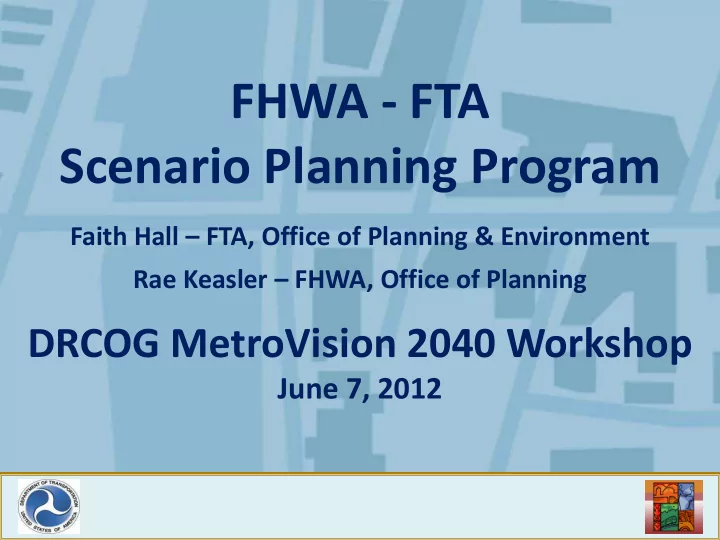

FHWA - FTA Scenario Planning Program Faith Hall – FTA, Office of Planning & Environment Rae Keasler – FHWA, Office of Planning DRCOG MetroVision 2040 Workshop June 7, 2012 FHWA/FTA
Support places that balance their economic and natural assets so the diverse needs of local residents can be met now and in the future.
By working together, [HUD, DOT, Transportation Choices and EPA] can make sure that when it comes to development— housing, transportation, energy Housing Choices efficiency—these things aren’t mutually exclusive; they go hand Economic in hand. And that means making Competitiveness sure that affordable housing exists in close proximity to jobs Support Existing and transportation. That means Communities encouraging shorter travel times and lower travel costs. It means safer, greener, more livable Align Federal Policies communities. President Barack Obama Value Communities
“Support economic vitality ; Increase safety and security of motorized and non-motorized users; Increase accessibility and mobility of people and freight; Protect and enhance the environment , promote energy conservation , improve quality of life , and promote consistency between transportation improvements and State and local planned growth and economic development patterns . . .” – 23 USC 134-35 / 49 USC 5303-5304
Department of Housing and Transportation Urban Development • TIGER Grants • Sustainable Communities • FTA New Starts, Bus Livability, and Regional Planning and Urban Circulator Grants Challenge Grants • Flex Funding • Affordable Housing • FHWA Discretionary Grants Programs • Technical Assistance • Capacity Building • Capacity Building • H+T Index Research + U.S. Department of Agriculture Environmental Protection Agency • Brownfields Areawide Planning Pilots • Smart Growth Implementation Assistance • Greening America's Capitals • Rural Development • Sustainable Communities Building Blocks
TPCB offers comprehensive training & technical assistance Supports state, local, regional, and tribal governments, transit operators, and community leaders Webinars, NHI / NTI, Travel Model Improvement Program, Center for Transit Oriented Dev’t, Research: TCRP / NCHRP ; Scenario Planning Workshops; Peer Exchanges www.planning.dot.gov
Website: www.fhwa.dot.gov/planning/scenario_and_visualization/ Reports from recent workshops Guidance & case studies Webinars Two webinars per year Range of topics at varied levels of sophistication Scenario Planning Guidebook Suggested six-phase framework Presents key steps/considerations and examples for each phase
Share Models of Local Successes Continue Coordination to Make Government Work Better Help Communities Solve Problems
USDOT for Denver FHWA, Bill Haas 720-963-3016 FTA, Dave Beckhouse 720-963-3306 USDOT Headquarters FHWA, Fred Bowers 202-366-2374 & Rae Keasler 202-366-0329 FTA, Jeff Price 202-366-0843 & Faith Hall 202-366-9055 USDOT Volpe Center Alisa Fine 617-494-2310 Alisa.Fine@dot.gov FHWA Resource Center Brian Betlyon 410-962-0086 & Jim Thorne 708-283-3538 Jim.Thorne@dot.gov
Recommend
More recommend